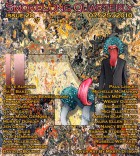Tell us about the humor in this story. It stays constant while you take us through a range of other emotions. Did you use it to balance the piece? Was the humor a way for you to first enter the story?
I think I almost always set out to write a story that is, above all else, funny, but in the course of writing it, something else seeps in that alters whatever light-hearted tone might have been present. Sometimes—and I’m not sure if these are the successes or the failures—the pathos of whatever the story is actually about ends up overshadowing or even eliminating the humor. In this case, I started with what seemed like a funny idea (about someone whose job it was to write snarky corrections for the newspaper) and realized that such a job could become more of a self-imposed penance. The humor gives it that grimace that, at first glance, could be mistaken for a smile, and maybe is a smile of determination that salvation will come through one’s suffering. Then sometimes I think I put too much thought into how to write humor and it all falls apart into a quivering mass of bad puns and arch asides.
Kate realizes that she is not forgiven for what she apologizes for. Did you know this was where the story was headed when you sat down to write it?
Around the time I wrote this story, I was following a blog called “Regret the Error,” which listed corrections found in newspapers throughout the world. Most of the entries are funny, but the point of the blog is really to address journalistic responsibility and accountability. So I initially thought about Kate in terms of a professional, journalistic relationship to her corrections. And as fascinating as the inner workings of a journalist’s mind truly are, I eventually realized that Kate’s corrections were really more of a mask for some internal struggle for accountability. Her problem is that she could be forgiven by everyone she’s hurt, but she’s not willing to forgive herself. Whether that’s because she isn’t truly sorry or because she’s done something unforgiveable, I’m not sure.
“They were merely words, hardened into meaninglessness.” A few of the lines in your story really moved me. This one is special because I can see it being applied to so many things. As a writer, do you feel like you have to work to keep your words from hardening into meaninglessness?
It’s interesting you ask that. I just recently sat down to write again after not doing so for some time and had a bit of a crisis of faith. I’m not sure whether my frustration was directed at my own unsatisfactory (and rusty) writing or if I somehow managed to broaden it to the meaninglessness of fiction as an entire genre. Does anyone really care what I have to say about some people and things that don’t exist? But then, words can ultimately only mean anything if we trust them to. Trust ourselves to mean them and others to appreciate them. It’s as simple and as complicated as that.
What are you working on now?
Well, I’m fond of short shorts, so I’ve been working on a few lately. I think it’s nice to go on a brief journey with a character, just long enough to get to understand what makes them tick without wearing out your welcome. It’s like networking, and if you’re lucky, you might come out of it with a new lease on life—although more likely, you’ll just end up with a half-recalled name and anecdote. I also have a fairly short attention span: it’s difficult enough for me to finish a 1000-word story, so I can’t imagine sticking it out for pages and pages. Which is to say that I am not working on a novel.



 The SmokeLong Grand Micro Contest (The Mikey) is now an annual competition celebrating and compensating the best micro fiction and nonfiction online.
The SmokeLong Grand Micro Contest (The Mikey) is now an annual competition celebrating and compensating the best micro fiction and nonfiction online.